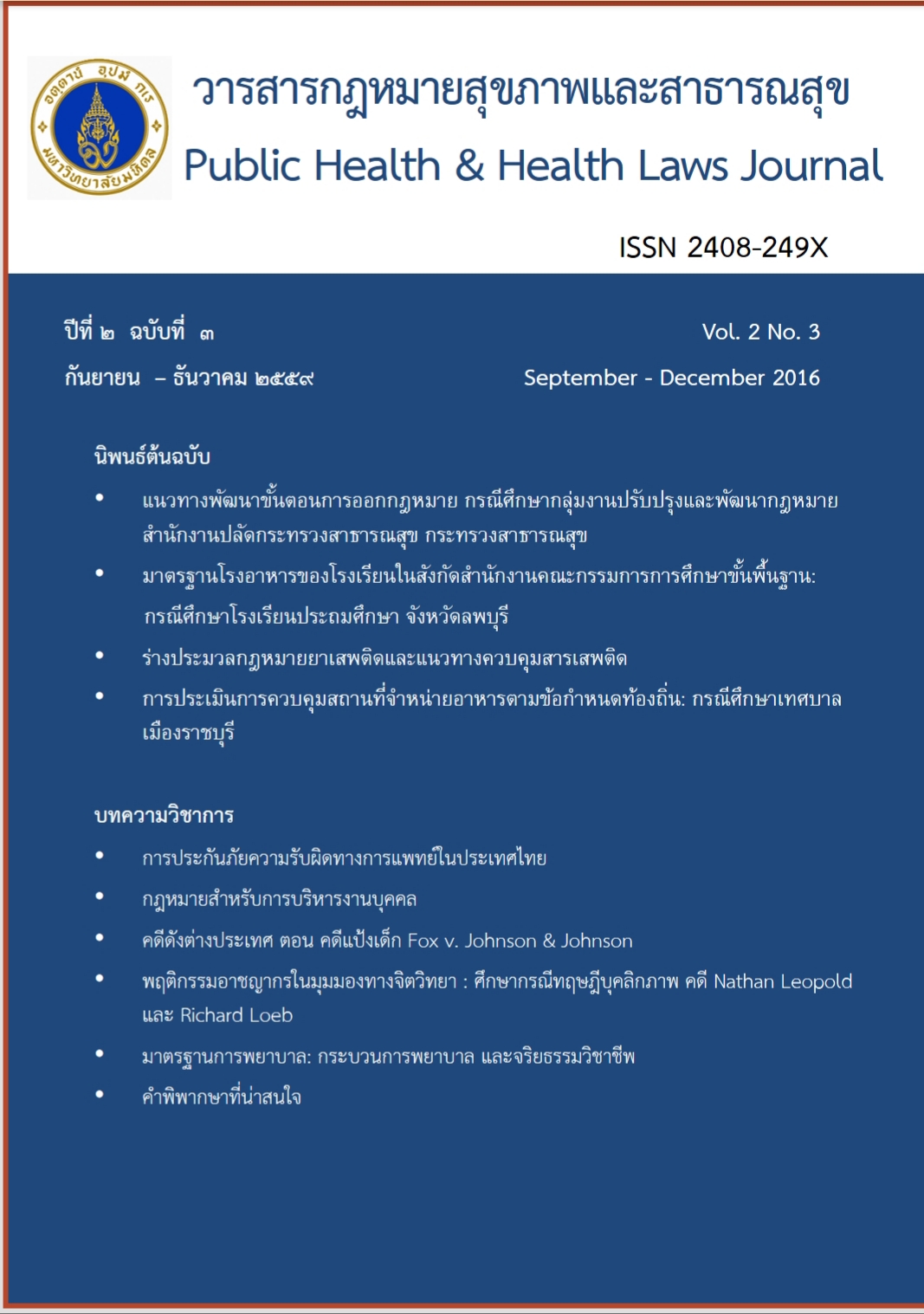Drafting of New Law Codification and Guidelines for regulating addictive substances
Keywords:
controlled substance laws, narcotics control, Compendium of Narcotic Code, decriminalizationAbstract
This study aims to review and analyze the 13 laws on narcotics prevention and suppression, and guidelines for the controlled substances. This is a qualitative research, by using documentary research and through attending meetings and observation of laws assessment. The study indicated that the United Nations passed a resolution to completely eliminate narcotic drugs from mankind and to establish an international convention. This convention has prescribed for UN member states to pass laws indicating severe penalty for criminal offenses relating to narcotic and controlled substances abuse. On the contrary, narcotics suppression did not achieve the objective.
Thailand is revising various narcotics and controlled substances laws, which have penalty/criminal code on drugs users. The Law Office of Narcotics Control is given the responsibility to revise/develop new laws by the Ministry of Justice. The revision of 7 laws will become compendium of Narcotic Code. This compendium will allow the judge the flexibility for his/her discretion to sentence for less than the minimum penalty prescribed for such offense. Only when there is a reasonable cause for specific case to consider the seriousness of the offense. As for the offender and the circumstances involved with narcotics, solving of the problems should be taken for all three aspects of suppression, prevention and treatment.
This research has following policy recommendations: 1) consider the concept of the right to health and human rights approach as guiding public health principles for health promotion and harm prevention. Drug users should be treated as a patient, eventhough he/she is being convicted for other offends. 2) personal using, especially for relieving pain from cancer, or terminal phase care at home, and 3) decriminalization, or legalization of control substances.
References
เวอร์จิเนีย แมคโดนัลด์ และ สุภัทรา นาคะผิว. (2556, พฤศจิกายน) การปราบปรามยาเสพติดและการลดอันตรายจากการใช้สารเสพติดในประเทศไทย. มปป.
ศักดิ์ชัย เลิศพานิชพันธุ์. (2556). การศึกษากฎหมายยาเสพติดในต่างประเทศ: ศึกษาเฉพาะกรณี ประเทศญี่ปุ่นฝรั่งเศส สวิสเซอร์แลนด์ เยอรมัน โปรตุเกส อังกฤษ และสหรัฐอเมริกา. กรุงเทพฯ: ชุมนุมสหกรณ์การเกษตรแห่งประเทศไทย จำกัด
ศิริพล กุศลศิลป์วุฒิ (มปป.). กฎหมายยาเสพติด. [ออนไลน์] available at http://www.bloggang.com/mainblog.php?id=jurisprudence&month=22-08-2014&group=24&gblog=59 Retrieved November 20, 2015.
สถาบันกฎหมายไทย มหาวิทยาลัยรามคำแหง. (2553). การเก็บรวบรวมข้อมูลและประมวลสถานการณ์ด้านการบังคับใช้กฎหมายเพื่อการพัฒนาวิธีพิจารณาคดีเกี่ยวกับยาเสพติด. สถาบันกฎหมายไทย มหาวิทยาลัยรามคำแหง [ออนไลน์] available at http://nctc.oncb.go.th/new/attachfiles/research/53_Pigaranakadee.pdf
ศูนย์วิชาการด้านยาเสพติด สำนักงานคณะกรรมการป้องกันและปราบปรามยาเสพติด [ออนไลน์] available at http://nctc.oncb.go.th/new/images/stories/conclusion/Diversion.pdf Retrieved November 20, 2015.
ศูนย์เทคโนโลบยีสารสนเทศ กองแผนงาน กรมราชทัณฑ์ สถิติผู้ต้องราชทัณฑ์คดี พ.ร.บ. ยาเสพติดทั่วประเทศสำรวจ ณ วันที่ 1 พฤศจิกายน 2559.
สุนีย์ มัลลิกะมาลย์ และ คณะ (2557, 25 เมษายน) ประสิทธิภาพการบังคับใช้กฎหมายและวิธีพิจารณาคดียาเสพติด. สำนักงานคณะกรรมการป้องกันและปราบปรามยาเสพติด. [ออนไลน์] available at http://nctc.oncb.go.th/new/attachfiles/research/57_Laws_Efficiency.pdf
สำนักงานคณะกรรมการกฤษฎีกา (2559) หนังสือที่ ยธ 1102(วก.) /3474 เรื่องพระราชบัญญัติให้ใช้ประมวลกฎหมายยาเสพติด พ.ศ. ... ถึงเลขาธิการคณะรัฐมนตรี. เอกสารอัดสำเนา.
สำนักงานคณะกรรมการป้องกันและปราบปรามยาเสพติด ศูนย์วิชาการด้านยาเสพติด (มปป.). [ออนไลน์] available at http://nctc.oncb.go.th/new/images/stories/conclusion/Compare.pdf)
สำนักพัฒนาการป้องกันและแก้ไขปัญหายาเสพติด สำนักงาน ป.ป.ส.(2554) ความรู้พื้นฐานเพื่อการป้องกันยาเสพติดในเยาวชน กรุงเทพฯ: ห้างหุ้นส่วนจำกัด ไอเดีย สแควร์)
Association of Southeast Asian Nations (2012), Joint declaration for a drug-free ASEAN, [online ] available at http://www.asean.org/communities/asean-political-security-community/item/joint-declaration-for-a-drug-free-asean
Davies C, English L, ,Stewart C, Lodwick A, McVeigh J, Bellis MA. (2011). United Kingdom: Drug Situation 2011 EDITION, UK Focal Point On Drugs. Annual Report to the European Monitoring Centre for Drugs and Drug Addiction (EMCDDA). [online ] available at http://www.nta.nhs.uk/uploads/2011.pdf
Csete, J. et al. (2011), ‘Compulsory drug detention centre experiences among a community-based sample of injection drug users in Bangkok, Thailand’, BMC International Health and Human Rights, 11: 12. doi:10.1186/1472-698X-11-12, [online ] available at http://www.biomedcentral.com/1472-698X/11/12
United Nations Office on Drugs and Crime & World Health Organisation (2008), Principles of drug dependence treatment (Vienna: United Nations Office on Drugs and Crime), p. 1, [online ] available at https://www.unodc.org/documents/drug-treatment/UNODC-WHO-Principles-of-Drug-Dependence-Treatment-March08.pdf
United Nations Office on Drugs and Crime (2013), World Drug Report, [online] available at http://www.unodc.org/wdr/
United Nations (2012), Joint statement – Compulsory drug detention and rehabilitation centres, [online] available at http://www.unaids.org/en/media/unaids/contentassets/documents/document/2012/JC2310_Joint%20Statement6March12FINAL_en.pdf
Downloads
Published
How to Cite
Issue
Section
License
Disclaimer and Copyright Notice
The content and information presented in articles published in the Journal of Law and Public Health Policy represent the opinions and sole responsibility of the respective authors. The editorial board does not necessarily agree with or assume any responsibility for the views expressed.
All articles, data, content, images, and other materials published in the Journal of Law and Public Health Policy are the intellectual property of the journal. Any individual or organization wishing to reproduce, distribute, or otherwise use the entirety or any part of such materials must provide proper citation.





